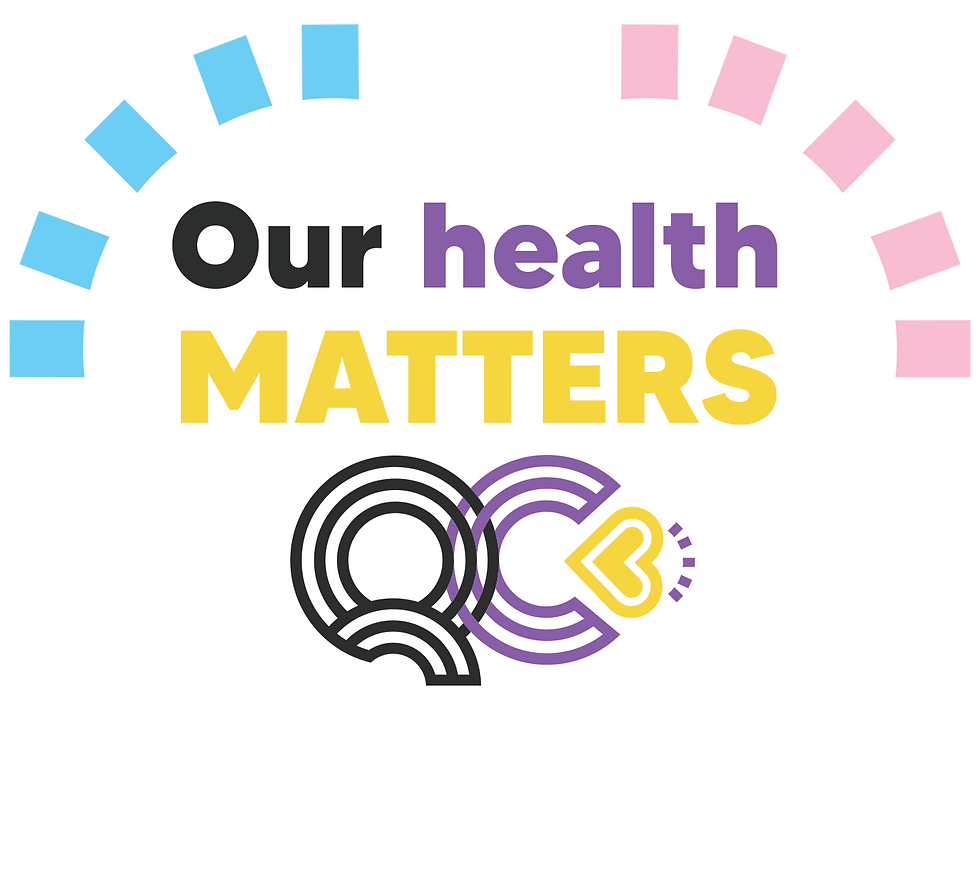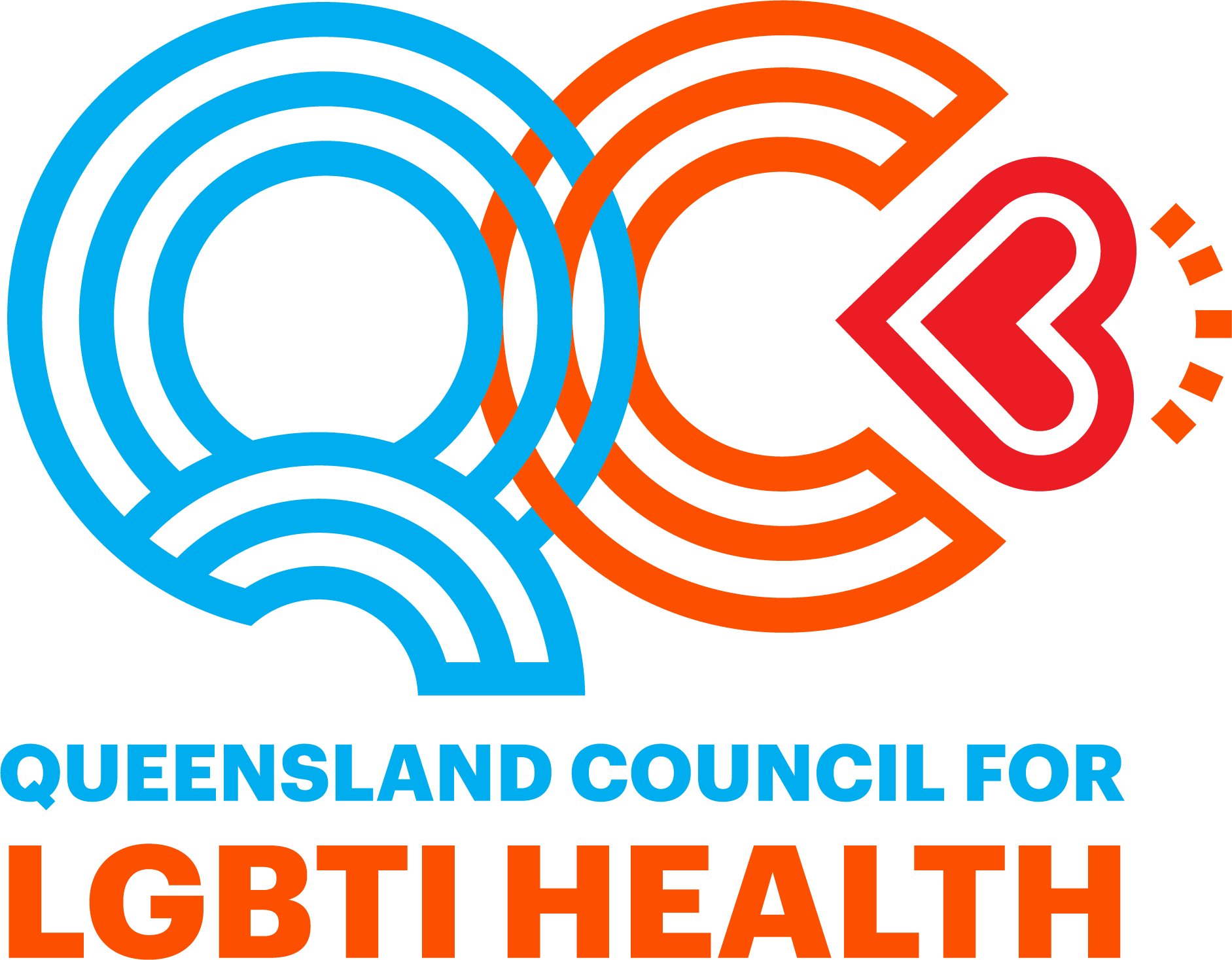.png)

Our Trans, Gender Diverse & Non-Binary Sistergirl and Brotherboy Communities

Gender Affirming Care FAQs for Young People in Cairns


Transgender, Gender Diverse & Non-Binary Health
QC believes in improving the health and well-being of Transgender, Gender Diverse, Non-Binary people within Queensland, and we believe in embracing and celebrating the diversity within our Transgender, Gender Diverse and Non-Binary people communities.
Support is also available for family, partners, friends, parents and allies.
We have a dedicated Health Promotion and Community Development (Trans, Gender Diverse and Non-Binary Health) team who can be contacted at dbarrett@qc.org.au or by phone at (07) 3017 1777.
Our Health Matters

TGDNB Statement of Commitment

Our promise to Trans, Gender Diverse and Non-Binary Communities in Queensland
Established 2021
As one of Queensland’s largest LGBTIQ+ Sistergirl and Brotherboy and HIV organisations, we are committed to actively welcoming all people who access our programs, services and spaces. It is our responsibility to ensure that every member of our diverse Trans, Gender Diverse and Non-Binary communities feel safe, valued, represented and appropriately supported to be able to be active participants in the co-design, delivery, accessing, monitoring and evaluation of our programs and spaces.
We commit to achieving this goal through an ongoing engagement in all areas of our work which will be guided by our Engagement Strategy and we also commit to using our influence in all areas of our work with external stakeholders and partners to advocate for these values, principles and ways of working to be embedded in their work.
Our Statement of Commitment
As an organisation, we have a responsibility to reflect the diversity of the communities that we serve and are led by. We know that our Trans, Gender Diverse and Non-Binary communities have some of the highest rates of psychological distress due to surviving and navigating environments that aren’t safe and the need to actively create and hold spaces of safety for Trans, Gender Diverse and Non-Binary people is a responsibility that needs to be shared by everybody, and one that QC will commit to championing wherever it is able to.
We acknowledge that historically, and still today, the need to create and hold safer spaces is not only one of safety and inclusion but also for connectedness.
We know, and Trans, Gender Diverse and Non-Binary people and communities in Queensland have told us, that this is especially true when talking about spaces that may have been, or still are, sites of violence, stigma, discrimination and trauma. Trans, Gender Diverse and Non-Binary people and communities in Queensland have asked us to partner together to reflect on our practice and processes to ensure that we do not contribute to ongoing violence experienced by so many in the Trans, Gender Diverse and Non-Binary communities in Queensland.
We intend to honour this request as best we are able, and this will be evident as we commit to the ongoing resourcing of this work and to amplifying the voices of our Trans, Gender Diverse and Non-Binary community members across all of Queensland.
We honour this request by committing to:
-
Resourcing this work sustainably to ensure its impact;
-
Amplifying the voices of Trans, Gender Diverse, and Non-Binary people across Queensland; and
-
Creating and strengthening pathways for TGDNB leadership in shaping community health and wellbeing initiatives.
Trans, Gender Diverse and Non-Binary people must continue to lead this work for our communities, and we commit to growing pathways to work together that will continue to grow the health and wellbeing of Trans, Gender Diverse and Non-Binary people and communities.
Our Engagement Strategy can be found here.

Our Health Matters, launched in 2023, was created by and for our Trans, Gender Diverse, Non-Binary, Sistergirl and Brotherboy (TGDNBSB) communities across Queensland.
It celebrates our strength, creativity, and resilience, and supports our communities to access the information, tools, and care that help us live fully, proudly, and on our own terms.
Our Health Matters recognises that health is shaped not only by services, but by the spaces where we are seen, heard, and valued. It aims to empower TGDNBSB people to take charge of their sexual health, wellbeing, and self-affirmation, while honouring the diversity of experiences within our communities.
Our Health Matters continues to grow, evolve, and centre joy, connection, and community care as we move toward stronger visibility, leadership, and wellbeing for TGDNBSB people across Queensland and beyond.
TGDNB Practice Guidelines

Practice Guidelines for working with Trans, Gender Diverse & Non-Binary (TGDNB) communities experiencing domestic, family and sexual violence.
This guide was developed in consultation with Trans, Gender Diverse and Non-Binary (TGDNB) community and draws on current evidence and literature in order to improve knowledge, skills and service responses from the violence prevention sector when working alongside TGDNB people experiencing domestic, family and intimate partner violence.
There is a growing evidence base indicating that TGDNB folks experience elevated rates of domestic and family violence, intimate partner violence and sexual violence, and where services in the violence-prevention sector are seeking to be inclusive and responsive, there remains a range of barriers to TGDNB people accessing and receiving support from violence prevention services. We would further recommend Rainbow Health Victoria’s Pride in Prevention Evidence Guide (2020) and Messaging Guide (2021) as relevant and supporting documents to this resource, keeping in mind the specific sector and resourcing contexts in our state of Queensland.
Currently, efforts to respond to TGDNB community needs may be presumed to fall within the policy domains of anti-discrimination or community and mental health, and while these areas are of fundamental importance, they do not fully account for gender-marginalising TGDNB experiences just as these policies do not sufficiently account for the gender-marginalising experiences of Queensland women, Issues of workforce participation, housing and homelessness, and domestic and family, intimate partner and sexual violence remain hugely impactful on our communities, and this is clearly indicated in the statistics shared later in this document. It is therefore critical that policies aimed at eliminating gendered inequality and violence meaningfully include and respond to Trans, Gender Diverse and Non-Binary communities and experiences rather than nominally including TGDNB women and Non-Binary people in a cursory manner that does not meet community needs.
We encourage that the violence prevention sector in Queensland works towards a goal, identified in Rainbow Health Victoria’s recent Pride in Prevention messaging guide, of “…a shared national primary prevention framework that is inclusive of LGBTIQ+ experiences of family and intimate partner violence” (Fairchild et al., p. 6, 2021). The messaging guide goes on to highlight the shortcomings of current efforts to address gender inequality in ways that meaningfully includes LGBTIQ+ and TGDNB communities:
“Continuing to address men’s violence against women can be done in ways that simultaneously challenge, rather than reinforce, the silencing and exclusion of LGBTIQ+ communities and their experiences. This needs to be done carefully as messaging intended to prevent men’s violence against women can sometimes inadvertently reinforce binary understandings of gender, and reinforce assumptions that ‘women’ and ‘men’ are both cisgender and heterosexual.
Similarly, primary prevention messaging specific to LGBTIQ+ communities could inadvertently detract from the importance of men’s violence against women as a social problem. For instance, well-meaning but simplistic attempts to ‘de-gender’ discussions of family violence can inadvertently feed denial of the impact of sexism, gender inequality and gender-based violence.”
2025 Trans, Gender Diverse, Non-Binary, Sistergirl & Brotherboy Conversations and Advisory

Join the Conversation. Help Shape the Future
We’re relaunching our Community Advisory Groups in 2025 - spaces by us, for us - led by Trans, Gender Diverse, Non-Binary, Sistergirl and Brotherboy people across Queensland.
These spaces are about connection, leadership, and real change - bringing our voices together to speak truth to systems and drive action from the ground up.
Whether you’ve been involved before or it’s your first time - this is your chance to be heard, connect, and help create something powerful.
Community Conversations – July & August 2025
We’re holding Community Conversations across Queensland as part of the next stage in building strong, community-led spaces where we are visible, valued, connected, and proud.
These sessions are happening alongside 2Spirits and the Queensland Council for LGBTI Health’s strategic outreach - meaning we’ll be in your region, making space for real yarns and real input.
Upcoming Sessions:
-
Toowoomba (Jagera, Giabal & Jarowair Land) – Thursday 17 July | 9:00am – 10:30am
-
Gimuy Cairns – Thursday 24 July | 1:00pm – 2:30pm
-
Meanjin Brisbane – Thursday 31 July | 9:30am – 11:00am
-
Gurambilbarra Townsville – Thursday 7 August | 10:00am – 11:30am
-
Naamba Sunshine Coast – Thursday 21 August | 10:00am – 11:30am
RSVP to a session near you HERE
Community Advisory Groups – Expressions of Interest Open Now
In September 2025, we’ll be forming a new state-wide Trans, Gender Diverse, Non-Binary, Sistergirl and Brotherboy Community Advisory Group, shaped by what we hear during these community conversations.
These groups are for those ready to:
-
Speak up
-
Lead change
-
Be part of something bigger
If you want to be part of this, we’d love to hear from you. It only takes a few minutes to submit.
Express your interest HERE
We’ll be in touch with next steps
Let’s Build Together
This is about building a future where our communities are:
-
Heard
-
Leading
-
Proud
Join us in creating spaces where Trans, Gender Diverse, Non-Binary, Sistergirl and Brotherboy people across Queensland are visible, valued, connected, and proud.





